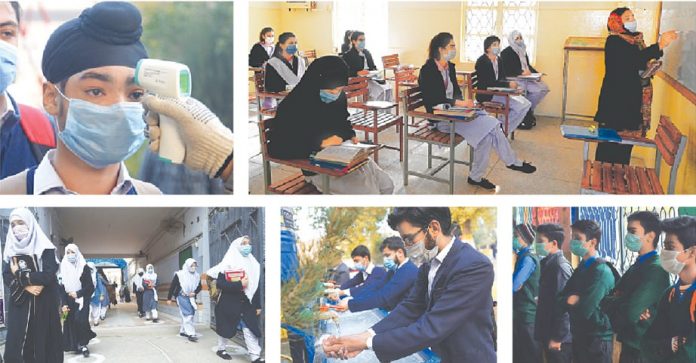ISLAMABAD: As the country reported 1,920 new coronavirus cases and 46 deaths in a single day, the Drug Regulatory Authority of Pakistan (Drap) on Monday approved another Covid-19 vaccine manufactured by Chinese state-owned firm Sinopharm.
Meanwhile, the Pakistan Medical Association (PMA), a representative body of doctors, has asked the government to share details of the vaccines which are under consideration for import as well as their efficacy rates.
Moreover, with the resumption of matric and intermediate classes across the country on Monday when the winter is on its peak, it is feared that coronavirus cases may further increase.
On the other hand, World Health Organisation (WHO) Director General Dr Tedros Adhanom Ghebreyesus revealed that during the last four decades the global community had lost battles against pandemics twice and urged the nations to avoid past mistakes and beat history as promise of equitable access to the vaccine was at serious risk.
Drap chief executive officer Dr Asim Rauf, while talking to Dawn, said the National Institute of Health (NIH) got the Sinopharm’s vaccine registered on its name. “The approval has been given for emergency use and it will pave the way for bringing the vaccine to Pakistan,” he added.
It is worth mentioning that Pakistan has already pre-booked 1.1 million doses of Sinopharm’s Covid-19 vaccine and after its approval by Drap the process of its import will start soon.
On Jan 16, Drap had approved AstraZeneca’s Covid-19 vaccine for emergency use in Pakistan.
In a statement, the PMA said Drap had reportedly approved AstraZeneca’s vaccine which is being manufactured by India. Pakistan will acquire this vaccine through Covax, for 20 per cent population, which is a global alliance for vaccine support.
“PMA wants to know the dosage of AstraZeneca’s Covid-19 vaccine; will it be administered once in life, once a year or more than that? Who will be the beneficiary of this free vaccine? PMA and other stakeholders should be taken on board by the government. Healthcare workers both from public and private sectors should be administered vaccine on a priority basis. Up till now 175 doctors and 30 paramedics have lost their lives due to Covid-19,” it stated.
PMA secretary general Dr Qaisar Sajjad said it was unfortunate that even the doctors, if infected with the virus, were not aware where to go for treatment as no beds were reserved for doctors in any corona-designated hospital.
“So many countries of the world have started vaccinating their people. Even India has started the world’s largest coronavirus vaccination drive under which more than 300 million people will be vaccinated. On the other hand, Pakistan might get the first consignment of free vaccine from Covax in the second quarter of 2021. Unfortunately, we do not see any such planning by our government for vaccinating people,” he regretted.
Dr Sajjad demanded that the government expedite the process of acquiring the Covid-19 vaccine. “Healthcare workers and people above 60 years of age suffering from diabetes, hypertension, cancer or any other uncompromised disease should be vaccinated on a priority basis,” he said.
According to data of the National Command and Operation Centre, 39 people died in hospitals and seven out of hospital during the last 24 hours. As many as 325 ventilators were in use across the country and the number of active cases reached 34,986.
Past mistakes
WHO Director General Dr Tedros, while speaking at an event, urged the global community to play their role in eradication of Covid-19. He recalled that 40 years ago a new virus [HIV] emerged and sparked a pandemic. Life-saving medicines were developed, but more than a decade passed before the world’s poor got access to them.
“Twelve years ago, a new virus [H1N1] emerged and sparked a pandemic. Life-saving vaccines were developed, but by the time the world’s poor got access, the pandemic was over. One year ago, a new virus emerged and sparked a pandemic. Life-saving vaccines have been developed. What happens next is up to us. We have an opportunity to beat history, write a different story and avoid the mistakes of the HIV and H1N1 pandemics.
“The development and approval of safe and effective vaccines less than a year after the emergence of a new virus is a stunning scientific achievement, and a much-needed source of hope. But we now face the real danger that even as vaccines bring hope to some, they become another brick in the wall of inequality between the world’s haves and have-nots,” he said.
“It’s right that all governments want to prioritise vaccinating their own health workers and older people first. But it’s not right that younger, healthier adults in rich countries are vaccinated before health workers and older people in poorer countries. There will be enough vaccine for everyone. But right now, we must work together as one global family to prioritise those most at risk of severe diseases and death, in all countries. We have secured two billion doses from five producers and we aim to start deliveries in February,” he added.
Dr Tedros said: “Covax is ready to deliver what it was created for. But in recent weeks I have heard from several member states who have questioned whether Covax will get the vaccines it needs, and whether high-income countries will keep the promises they have made. As the first vaccines begin to be deployed, the promise of equitable access is at serious risk. More than 39 million doses of vaccine have now been administered in at least 49 higher-income countries. Just 25 doses have been given in one lowest-income country. Not 25 million; not 25 thousand; just 25.”
He said: “I need to be blunt: the world is on the brink of a catastrophic moral failure — and the price of this failure will be paid with lives and livelihoods in the world’s poorest countries. Forty-four bilateral deals were signed last year, and at least 12 have already been signed this year.
“The situation is compounded by the fact that most manufacturers have prioritised regulatory approval in rich countries where the profits are highest, rather than submitting full dossiers to WHO. This could delay Covax deliveries and create exactly the scenario Covax was designed to avoid, with hoarding, a chaotic market, an uncoordinated response, and continued social and economic disruption.
“A recent study estimated that the economic benefits of equitable vaccine allocation for 10 high-income countries would be at least 153 billion US dollars in 2021, rising to 466 billion dollars by 2025. That’s more than 12 times the total cost of the Access to Covid-19 Tools Accelerator.”








